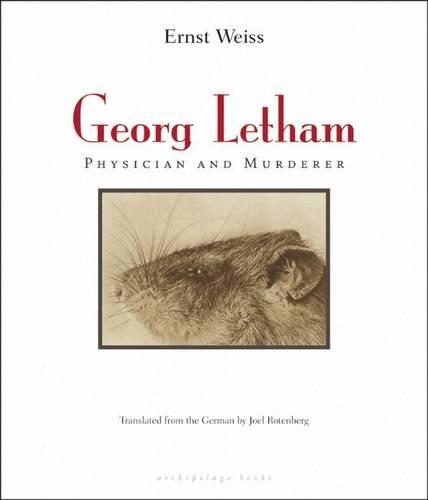
Georg Letham: Physician And Murderer
(Paperback)
Publishing Details
Georg Letham: Physician And Murderer
By (Author) Ernst Weiss
Translated by Joel Rotenberg
Archipelago Books
Archipelago Books
15th December 2014
United States
Classifications
General
Fiction
833.912
Commended for Best Translated Book Award (Fiction) 2011
Physical Properties
Paperback
560
Width 152mm, Height 191mm
644g
Description
Written in a highly unreliable first person narrative, Ernst Weiss' unsung masterwork is an account of a crime and its aftermath. The hero (or villain) is tried, sentenced and deported to a remote island. He seeks redemption from his crimes in science, but eventually learns that in spite of himself he is a man of feeling. Weiss' book came out of the same fertile literary ground between the wars that produced Musil's The Man Without Qualities (Picador, 1930) and, like many other modernist classics, it is a prescient description of a profoundly unsettled society.
Reviews
I wonder why Weiss isnt better known here. A doctor as well as a writer, he knew about the body as well as the heart, and you can trust him when he describes how each can act on the other. The Guardian
A compelling, creepy read. Monica Carter,Three Percent
Ernst Weiss is in fact one of the few writers who may justly be compared to Franz Kafka . . . This is easily one of the most interesting books I have come across in years . . . One is filled with impressions, stimulated, gripped by images, characters, and episodes that are strangely real but also unforgettably fashioned. And, incidentally, its all very Austrian. Thomas Mann
What an extraordinary writer he is! Franz Kafka
If one could write a book about the internal feelings of Hitler, Mussolini, Stalin, or any other man who brings nightmares to life this would be it. Zahar Laor, ManofLaBook.com
Vivid. . . . [With] the thrill of intellectual obsession. . . . Weiss's novels are remarkable for their ambitious conceits, stylistic variation, and unusual characters. . . . He uncovers the fear, apathy, longing and rage for which the now clichd psychoanalytic terms were invented. The Nation
Part medical detective story and part criminal confession. . . . the story addresses . . . justice, punishment, altruism, the fear of illness, the joy of recovery, the ecstasy of being alive, and the absolute worth of a single human life. . . . From a literary standpoint, readers can expect a sizeable reward. Journal of the American Medical Association
What makes Georg Letham so fascinating is not that he is a murderer, but that he knows this and is still plagued with a compulsion to contribute to humanity . . . He kills for money, but when stripped of the need for money and forced to live, he becomes more of a human being. Salonica
Author Bio
Ernst Weiss, born in 1882 in Brunn, Moravia in the Austro-Hungarian Empire, was a trained physician. His years as a ship's doctor are apparent in much of the detail in Georg Letham. Weiss' work emerges from an expressionist background but belongs with the modernist classics. Joel Rotenberg translated Chess Story and The Post-Office Girl by Stefan Zweig and Hugo von Hofmannsthal's The Lord Chandos Letter for the New York Review Books Classics series.
